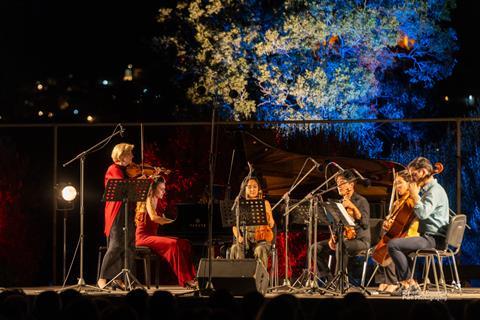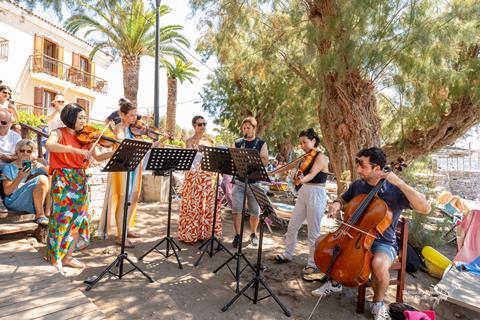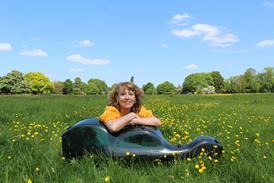On the Greek island of Lesbos, the Molyvos International Music Festival offers live chamber music to a diverse international audience, as Claire Jackson discovered

Discover more Featured Stories like this in The Strad Playing Hub.
Read more premium content for subscribers here
The holidaymakers stretch out on loungers; some take cover from the sun under umbrellas, while others turn carefully to ensure an even tan. Children splash in the pool, watched by parents sipping cool Mythos beer. A Byzantine castle set atop a large hill looms against solid blue skies. Beyond the nearby flower beds, dark sands lead to the Aegean Sea. Molyvos, a small village on the island of Lesbos, is an idyllic spot spared some of the tourist trappings found elsewhere in Greece. The only disruption comes from a string ensemble, which gathers beside the sun worshippers. The musicians play an arrangement of Beethoven’s ‘Pastoral’ Symphony; silence falls as everyone stops to listen. Table tennis bats are temporarily rested; two swimmers float at the side of the pool, mermaid-like as they watch the violinist from the water. There’s a reason why they are so enraptured: with finely spun phrases and an exquisite tone, the quality of the performance wouldn’t be out of place at Wigmore Hall.
As it happens, violinist Antje Weithaas did recently play a series at Wigmore, crafting Bach sonatas alongside harpsichordist Mahan Esfahani. Weithaas turns so that a young ‘audience’ member on a plastic chair nearby can get a better view. What appears to be an impromptu busk is actually part of a carefully curated series: these are ‘musical moments’ from the Molyvos International Music Festival (MIMF), where musicians – mainly strings, sometimes enhanced by clarinet or guitar – from the main concert strand play pop-up recitals. Later, as listeners assemble on the beach to hear Byol Kang and Rosanne Philippens (violins), Tomoko Akasaka (viola), Timotheos Gavriilidis-Petrin (cello) and Sebastian Manz (clarinet) play excerpts from Brahms’s Clarinet Quintet against the sound of lapping waves, a man exclaims loudly in Greek. He’s very animated, almost overcome with emotion, and the hand gestures lead me to assume that he wants us to move away. I couldn’t be more wrong: he’s praising the performance, saying that he’s never heard anything like this before, that Molyvos has never before experienced music of such calibre. It’s a powerful response – and exactly the reason why the ‘musical moments’ are shared.
Actually, Molyvos has been a place for international chamber music for some time – the MIMF, which takes place every August, is celebrating its tenth anniversary. The festival was established by German–Greek pianist sisters Danae and Kiveli Dörken with their mother Lito Dakou, who comes from Molyvos. Born and now based in Germany, the Dörkens set up the MIMF as an opportunity to share Western classical music with new audiences. The ancillary concerts are a major part of the festival and include a children’s event where tourists, locals and refugees are brought together for an engaging performance and invited to try the instruments. The initiative came about after the 2015 migrant crisis, when thousands of displaced people from Syria, Afghanistan and elsewhere arrived on Lesbos by boat from nearby Turkey. The devastating impact on both the newcomers, who lived in limbo in sprawling camps, and the island’s community was the topic of the subsequent festival, themed ‘crossroads’.
The quality of the performance wouldn’t be out of place at Wigmore Hall
The intervening festival editions have paid homage to the changing situation in Lesbos, covering topics such as ‘catharsis’, ‘genesis’ and ‘liberty’. The Dörkens always present the nightly performances themselves, explaining the repertoire to international audiences (alternating between Greek and English), helping to build a dedicated support base. It’s fitting that the tenth anniversary edition theme was ‘friendship’, exploring the Aristotelian idea that there can be three aspects to relationships: utility, pleasure and virtue. This was represented musically by works such as Lucas Thanos’s On Love and Friendship (a world premiere, for strings and piano), Chausson’s Concerto in D major for violin, piano and string quartet and Mendelssohn’s First String Quintet, among others.
Collaboration is crucial in any chamber music festival, but particularly so in Molyvos, where a selected group of musicians work together closely – and intensely. There are some regulars (violinists Noé Inui and Weithaas, for example), with newcomers also joining, especially from Germany and mainland Greece. ‘Danae and Kiveli have great skill at choosing the right people and repertoire,’ says Weithaas. ‘We work hard and we enjoy the beautiful views, the sea and the parties.’ Those take place at Congas, a beach bar where players (all wearing earplugs, of course, to protect their hearing against pumping music) and supporters let off steam on the dance floor into the early hours. ‘This is where we really learn how to be chamber musicians,’ jokes one violinist.

There are particular challenges to playing at MIMF. Concerts are always outside, sometimes on ancient sites such as Thermi, built in 3,000BC, often in the castle, or, while that site is being repaired, on a beachside stage set up on a tennis court within the Delfinia Hotel complex. Lesbos, closer to Turkey than it is to Athens, is consistently hot in summer – MIMF concerts take place at 9pm, for the benefit of both musicians and audience. Bats perform a ballet across the dusky backdrop. There’s often a strong breeze, which, while welcome in the heat, means that amplification is required. ‘There is a necessity to use an iPad,’ observes Weithaas, ‘otherwise pages will fly away. Of course, it can be hard to get the balance right – there is the sound of the sea, birds and the odd motorbike. But this creates a fantastic atmosphere.’
It might have been down to the heat that Philippens’s E string broke as she led the Bruch String Octet in the final concert of the 2024 edition. There was a distinctive ‘ping’ as she zipped through the Allegro moderato. Luckily, Weithaas was on hand to loan her her 2001 Stefan-Peter Greiner violin, with which, after a very brief warm-up, Philippens continued the performance. Whether it’s by the pool, on the beach or on a more official stage, playing to professionals or to children, these musicians – and this festival – never fail to impress.
Read: Postcard from Scotland: East Neuk Festival
Read: Postcard from Norway: Bergen International Festival
Discover more Featured Stories like this in The Strad Playing Hub.
Read more premium content for subscribers here
The number one source for playing and teaching books, guides, CDs, calendars and back issues of the magazine.
In The Best of Technique you’ll discover the top playing tips of the world’s leading string players and teachers. It’s packed full of exercises for students, plus examples from the standard repertoire to show you how to integrate the technique into your playing.
The Strad’s Masterclass series brings together the finest string players with some of the greatest string works ever written. Always one of our most popular sections, Masterclass has been an invaluable aid to aspiring soloists, chamber musicians and string teachers since the 1990s.
The Canada Council of the Arts’ Musical Instrument Bank is 40 years old in 2025. This year’s calendar celebrates some its treasures, including four instruments by Antonio Stradivari and priceless works by Montagnana, Gagliano, Pressenda and David Tecchler.





































No comments yet